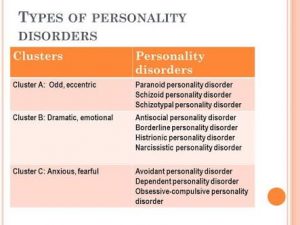Personality clusters
The specific personality disorders are grouped into the following three clusters based on descriptive similarities:

Cluster A (odd or eccentric disorders):
Cluster A personality disorders are often associated with schizophrenia: in particular, schizotypal personality disorder shares some of its hallmark symptoms, e.g., acute discomfort in close relationships, cognitive or perceptual distortions, and eccentricities of behavior, with schizophrenia. However, people diagnosed with odd-eccentric personality disorders tend to have a greater grasp on reality than do those diagnosed with schizophrenia. Patients suffering from these disorders can be paranoid and have difficulty being understood by others, as they often have odd or eccentric modes of speaking and an unwillingness and inability to form and maintain close relationships. Though their perceptions may be unusual, these anomalies are distinguished from delusions or hallucinations as people suffering from these would be diagnosed with other conditions. Significant evidence suggests a small proportion of people with Cluster A personality disorders, especially schizotypal personality disorder, have the potential to develop schizophrenia and other psychotic disorders. These disorders also have a higher probability of occurring among individuals whose first-degree relatives have either schizophrenia or a Cluster A personality disorder..
- Paranoid personality disorder: characterized by a pattern of irrational suspicion and mistrust of others, interpreting motivations as malevolent.
- schizoid personality disorder: lack of interest and detachment from social relationships, apathy, and restricted emotional expression.
- Schizotypical personality disorder:pattern of extreme discomfort interacting socially, and distorted cognitions and perceptions.
Cluster B (dramatic, emotional or erratic disorder.
-
Anti social personality disorder:pervasive pattern of disregard for and violation of the rights of others, lack of empathy, bloated self-image, manipulative and impulsive behavior.
- Narcissistic personality disorder: pervasive pattern of grandiosity, need for admiration, and a perceived or real lack of empathy.
- Histrionic personality disorder:pervasive pattern of attention-seeking behavior and excessive emotions.
Cluster C (anxious or fearful disorders).
-
- Dependent personality disorder:pervasive psychological need to be cared for by other people.
- Avoidant petsonality disorder:pervasive feelings of social inhibition and inadequacy, extreme sensitivity to negative evaluation.
- Obsessive compulsive disorder:characterized by rigid conformity to rules, perfectionism, and control to the point of satisfaction and exclusion of leisurely activities and friendships (distinct from obsessive-compulsive disorder).






